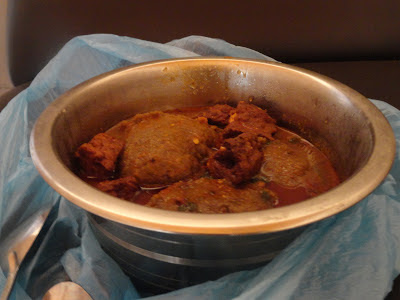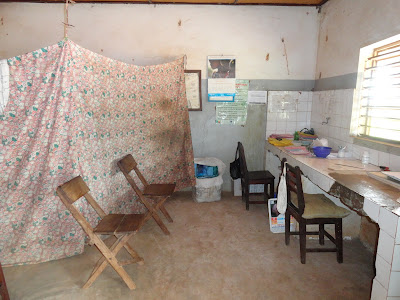Perhaps it is time to answer one of the questions I hear most often: "What do you actually do?" (In reality, the more accurate question would be, "What will you actually do?" I'll explain why in a bit.).
The short answer is that I am a health volunteer assigned to a public health clinic. Since I arrived in my village, my primary projects have been helping with pre-natal visits and vaccinations. With time, my focus should turn to educational activities.
This is because Peace Corps focuses on what it calls "capacity building". This is essentially the "teach a man to fish" approach. Peace Corps strives for "sustainable development", meaning that the impact of a volunteer's work should extend far beyond the length of his/her stay. Rather than providing a lot of aid and infrastructure, as other development organizations do, Peace Corps wants communities to learn how to tap their own resources and take advantage of the talents and goods already available in the community.
Therefore, my role is predominantly educational. With community partners, I will teach villagers how to live more healthy lives, and I will help train members of the community to teach that to others in the future. That way, my work will continue to spread and leave an impact long after I leave Benin.
Allow me to share a few concrete examples. One project that I am to undertake is called Care Groups. A Care Group is a group of ten women who meet once or twice a month to learn about a new health topic (nutrition, breastfeeding, malaria prevention, etc). After the lesson, each woman is responsible for sharing the lesson with ten households in her neighborhood. Thus, 110 households will learn this lesson, hundreds of people will be affected, and the knowledge of the health practices taught will stay in the community after I leave.
Another project is called Amour et Vie. Two young adults, one boy and one girl, become peer educators, and a community member is chosen as the community coordinator. The boy and girl are trained on a variety of health topics (sex ed, malaria prevention, etc), and then they teach these lessons to their peers. My role is to get the ball rolling and supervise the project in the first year. After the first year, I turn all control over to the community coordinator, and the project will continue without my intervention.
A third example is moringa. Moringa is a tree whose leaves possess remarkable nutritional properties (high in vitamins, calcium, protein, etc). Leaf powder can be added to foods as a nutritional supplement and can thus play an important role in fighting malnutrition. Few Beninese understand the value of moringa and how to use it, even though it exists in many communities. Therefore, my local supervisor has asked me to help him grow moringa, distribute seeds to families, and teach them to grow and prepare moringa for their families' nutritional benefit.
All of my projects are to be done with a local community partner. My job is not to march into my village and start telling everyone what to do, but rather to listen to my community and determine with them what my role will be.
And this brings me to the point that I said I would address later. I didn't jump into projects from day 1 because the first few months are like a sort of listening tour. I need to know more about my community, its resources, its key players, and its needs before I can really start my work. I have been helping out with pre-natal visits and vaccinations from the start not only because the health clinic could use an extra hand, but also because it is a way of learning more about my community. With time, I will start undertaking educational projects.
All of the above falls under just one of the Peace Corps' goals: helping the host country meet its need for trained men/women. Peace Corps' second and third goals are to teach the Beninese about Americans and to teach Americans about the Beninese. I share my American culture daily with members of my community. And you, dear reader, are helping me fulfill a Peace Corps goal by learning about Benin through my blog. Thanks for your help!

















































